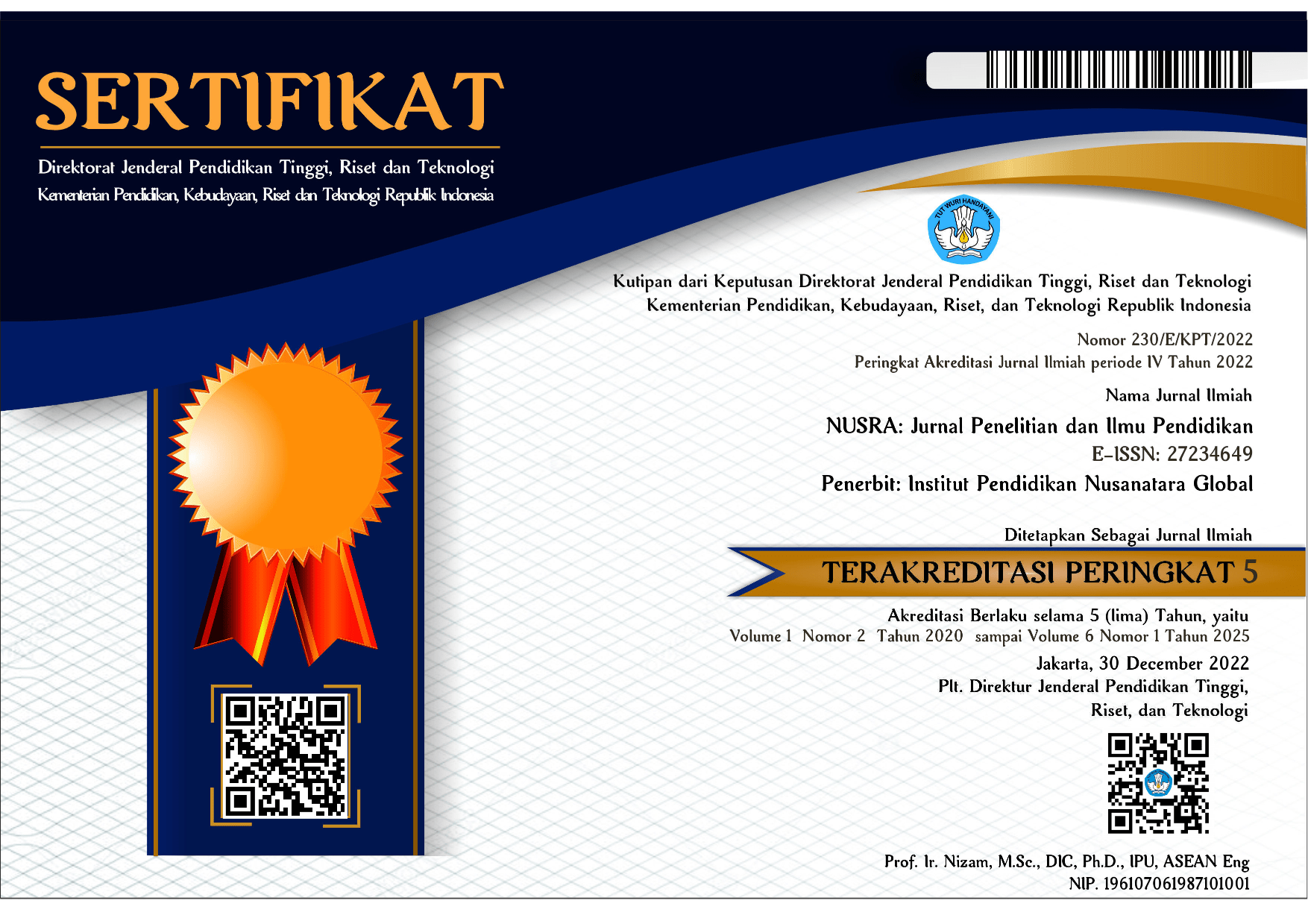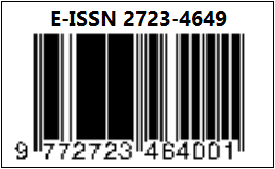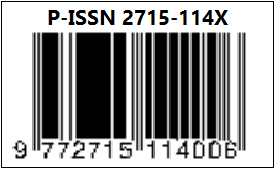Sikap Positif Mahasiswa Terhadap Penggunaan Bahasa Indonesia dalam Lingkungan Kampus STKIP PGRI Pacitan
DOI:
https://doi.org/10.55681/nusra.v5i1.976Keywords:
Positive Attitude, Indonesian Language, STKIP PGRI PacitanAbstract
The purpose of this research was to understand the forms of language attitudes and the factors influencing the language attitudes of students at STKIP PGRI Pacitan towards the Indonesian language. The approach used was descriptive qualitative. Data collection methods in this research included observation, questionnaires, and interviews. The data analysis method used Miles and Huberman's analysis method, which involved data reduction, data presentation, and drawing conclusions. The results of the study showed that the majority of students in the STKIP PGRI Pacitan campus (93%) exhibited loyalty and pride in using the Indonesian language in various aspects, including communication on social media, entertainment, and daily interactions. They were aware of the importance of the Indonesian language in maintaining national unity and considered it attractive and sustainable in the era of globalization. This positive attitude was influenced by factors such as students' knowledge and experiences, a supportive campus environment, emotional aspects as Indonesian citizens, the influence of mass media, and the role of educational institutions. In this increasingly advanced digital era, it is important to continuously enhance understanding, create a supportive environment, and provide resources that promote the use of proper and good Indonesian language to maintain this positive attitude consistently.
Downloads
References
Ahmadi, Alpan. Cross-Cultural Literacy in Social, Economy and Politic Perspective of Studies TISOL. AKSIS: Jurnal Pendidikan Bahasa dan Sastra Indonesia Volume 4 Nomor 1, Juni 2020
Ajzen, I. (2005). Attitude, Personality, and Behavior. New York: McGraw Hill.
Arikunto, Suharsimi. (2016). Prosedur Penelitian Suatu Pendekatan Praktik. Jakarta: Rineka Cipta.
Azhar, Iqbal Nurul, dkk. (2011). Sosiolinguistik Teori dan Praktik. Surabaya: Lima-lima Jaya.
Azwar, Saifuddin. (2013). Sikap Manusia Teori dan Pengukurannya. Yogyakarta: Pustaka Pelajar.
Chaer, Abdul & Leoni Agustina. (2014). Sosiolinguistik: Perkenalan Awal. Jakarta: Rineka Cipta.
Jendra, I. M. I. (2010). Sociolinguistics (The study of societies language). Yogyakarta: Graha Ilmu
Kridalaksana, Harimurti. (2011). Kamus Linguistik Edisi Keempat. Jakarta: Ikrar Mandiriabadi.
Mansyur, Umar. (2019). “Sikap Bahasa Mahasiswa dan Implikasinya Terhadap Pembelajaran Bahasa Indonesia di Perguruan Tinggi”. Jurnal Gerakan Aktif Menulis. Vol. 7 No. 2 tahun 2019. Makasar: Universitas Muslim Indonesia.
Notoatmodjo, S. (2005). Metodologi Penelitian Kesehatan. Jakarta: Rineka Cipta.
Nuryani. (2019). Sikap Bahasa Remaja Urban Terhadap Bahasa Indonesia di Era Milenial (The Language Attitude of Urban Teenagers Towards Indonesian in The Millennial Era). Jurnal Kandai, Vol.15, Nomor 1, Halaman. 1-15.
Riana, R., dan Setiadi, S. (2015). Pengaruh Sikap Berbahasa Terhadap Penerapan Bahasa Indonesia Dalam Penulisan Skripsi Mahasiswa Fakultas Ilmu Budaya, Universitas Diponegoro. Jurnal Dinamika Sosbud, Volume 17, Nomor 2, Juni 2015: 104 – 116.
Walgito, B. (2003). Psikologi Sosial (Suatu Pengantar), Edisi Revisi, Jogjakarta: Andi Offset.
Wijayanti, S.H., Darmoyo, S., & Dhian, Y.C. (2018). Sikap bahasa guru sekolah dasar terhadap bahasa Indonesia ragam tulis baku. Jurnal Pendidikan Bahasa dan Sastra, 18(1),28-43. doi: 10.17509/bs jpbsp. v18i1.12144.
Downloads
Published
How to Cite
Issue
Section
License
Copyright (c) 2024 Agoes Hendriyanto, Bakti Sutopo, Catur Apriyani

This work is licensed under a Creative Commons Attribution-ShareAlike 4.0 International License.














